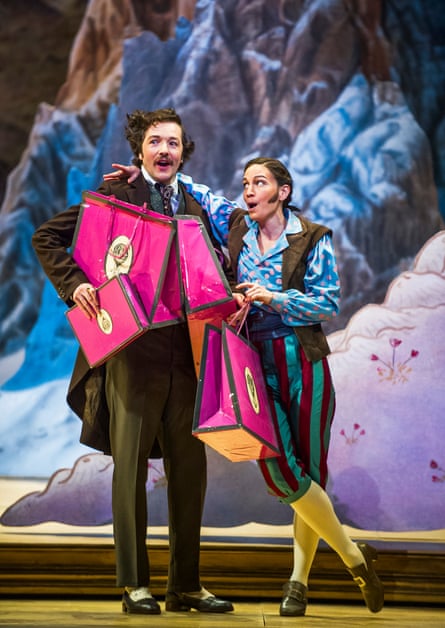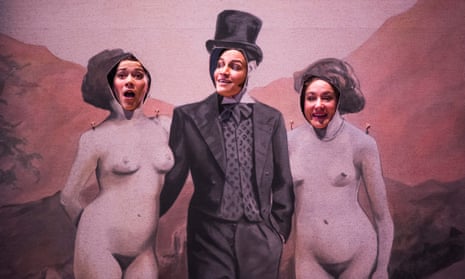In director Mariame Clément’s production of Emmanuel Chabrier’s L’Etoile (1877), receiving its Covent Garden premiere, we get off to a lively start – the overture is accompanied by mime. Against an oriental screen, on opposite sides of the stage, are a leather Chesterfield and an armchair occupied by two preening gents, as if to evoke a London club in an Edwardian moment. Smith (splendid comedian and actor Chris Addison) vanishes behind his newspaper and pops back into view for each fresh swig of tea. His opposite number, Dupont, is the excellent French actor Jean-Luc Vincent, and in tandem they jolly the evening along.
To the sound of yearning strings, they tuck into breakfast, fidget with sugar tongs and get dressed (Dupont twirls to the music while forcing his foot into a boot). But what they are preparing to face is not the day but the opera itself. This is Clément’s postmodern initiative: they are the critics who will apologise for – or intervene to clarify – a potentially confounding plot. At one point Addison even has an amusing altercation with conductor Mark Elder (celebrating 40 years at Covent Garden), addressing him in the pit, urging him not to repeat a tune (although, actually, it is the orchestra’s decisive performance that glues the evening together).

So far, so tickling (there is actual tickling in this opera too). But as the story unfolds, Clément, supported by ingenious designer Julia Hansen, reminds us that having fun can be hard work. The busily exotic tableau vivant of a set-within-a set includes at various points: float-on clouds the colour of candy floss, a Monty Pythonesque cardboard finger descending accusingly from above, and man-sized bottles of green chartreuse. Thorough use is made, too, of a huge, dirty postcard (mountainside as opposed to seaside) with cut-out holes through which the faces of bold ladies are inserted to appear above buxom bodies – a laborious titillation that includes the surprise of a lewdly double-jointed cardboard leg belonging to the man between them. The Royal Opera House takes the leg in its stride, but this classy panto is, at times, only just the safe side of embarrassing.
The opera is about despotic King Ouf whom we encounter in disguise, an eye-catching spy in gold lamé and shades, searching for someone to execute. Christophe Mortagne gives a first-rate performance – an Ouf with oompf. The king is not pleased to encounter servile royalists but delighted to bump into Lazuli, a travelling hawker, dressed like a principal boy (Kate Lindsey is supple-voiced and charming, though her voice lacks the power it ideally needs), whom he deems rude enough to execute. A clairvoyant (Simon Bailey, a dependable singer in a suspect role) happens to be in the vicinity and warns Ouf that it’s his destiny to die at the same time as Lazuli. Lazuli is thus rescued from an invitation to sit in an “impaling chair” – a scene of potential sadism set to the most decorous music.
Lazuli falls in love with Princess Laoula (beautifully sung by Hélène Guilmette with a welcome seriousness in all the right places). Hérisson de Porc-Epic (the excellent François Piolino) and his wife (a dashing Julie Boulianne) had initially planned to dish up Laoula to King Ouf as a wife. But the best laid plans…
And this applies to the singing too. Though standards are high, too often the voices, with the exception of Mortagne’s, did not seem big enough for the space. And this question of how the space is filled applies to the opera too. L’Etoile is such a slight piece, though the programme petitions us to look for deeper meanings. There are no sublime highs, heart-breaking lows or half-hidden truths. It is opéra bouffe and plays out like an extended joke without a satisfactory punchline. Chabrier’s pretty harmonies are at odds with the plot’s lumbering absurdity. It’s as if an overweight clown were to insist on sitting on a daintily embroidered cushion. It’s an amusing production if you don’t want to be inconvenienced by emotion – and its cast make superlative efforts – but if I were breaking the piggy bank to afford a night at Covent Garden, this is not the show I would choose to see.

Comments (…)
Sign in or create your Guardian account to join the discussion